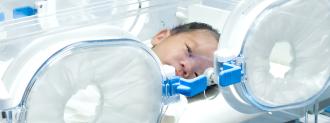Physical contact is extremely important for babies — not only does a human’s touch soothe them when they’re stressed, it also helps with weight gain and brain development.
However, for about 10% to 15% of babies born in the U.S., this physical contact isn’t always possible — those infants are born prematurely or with health issues that require them to be sent straight from the delivery room to a neonatal intensive care unit (NICU) where they’ll spend weeks or even months being closely monitored in an incubator.
Incubators provide preterm babies with a safe, controlled environment while their vital organs develop, but the NICU isn’t always the most stress-free setting for an infant.
Unlike a home nursery, the hospital is filled with people, lights, and sounds — and the babies may have to spend hours without a parent or other caregiver to soothe them. This can be extra stressful for babies who have to undergo regular, painful procedures like blood draws.
To ease this stress — and potentially protect babies’ health — researchers at the University of British Columbia developed a therapeutic bed called Calmer.
The device fits inside incubators and gently moves up and down in a way that mimics the motion of a person’s chest as they breathe. A speaker inside the therapeutic bed, meanwhile, plays the sound of a heartbeat.
In 2019, the researchers tested the ability of Calmer to provide pain relief to preterm infants during blood draws. Pain was assessed by measuring the babies’ heart rates and monitoring their facial and hand movements.
The study showed that the babies who were comforted with Calmer showed no greater signs of pain during the procedure than babies who were comforted by a human caregiver.
Now, a new study involving 29 preterm babies indicates that Calmer can keep babies’ brain oxygen levels steady during stressful blood draws.
“For newborns and particularly for preterm babies, it’s critical to keep overall blood oxygen levels steady, especially in the brain,” researcher Manon Ranger said in a press release. “The more stable their brain oxygenation is, the better for their brain development.”
The study found that the therapeutic bed is just as effective as physical touch.
“We were very pleased that our preliminary trial results showed that Calmer has the potential to benefit these infants whose brains are particularly vulnerable to pain and stress,” researcher Liisa Holsti said in the press release.
“We are expanding our evaluation of this device in more rigorous real-world conditions, and we’re in the process of redesigning it to be used in low- and middle-income countries, so that infants worldwide who need it can have the benefit of Calmer treatment.”
We’d love to hear from you! If you have a comment about this article or if you have a tip for a future Freethink story, please email us at [email protected].





